At inaugural Africa Skills Week, FCA, GIZ , ILO and UNHCR bring refugees to the table
“My bio doesn’t say refugee but rather a business owner and an aspiring lawyer. Create an environment that allows us to live as assets, because that is what we are – ASSETS, not liabilities.”
SO SAID Grace Bogui, an entrepreneur, who arrived in Ghana 13 years ago as a refugee from Cote D’Ivoire. After unimaginable hardships during her flight to safety, including losing her 10 year old brother, cooking became her escape. Using her hands, she brought joy to people around her and was able to dream again. She became an entrepreneur and went on to study human rights law.
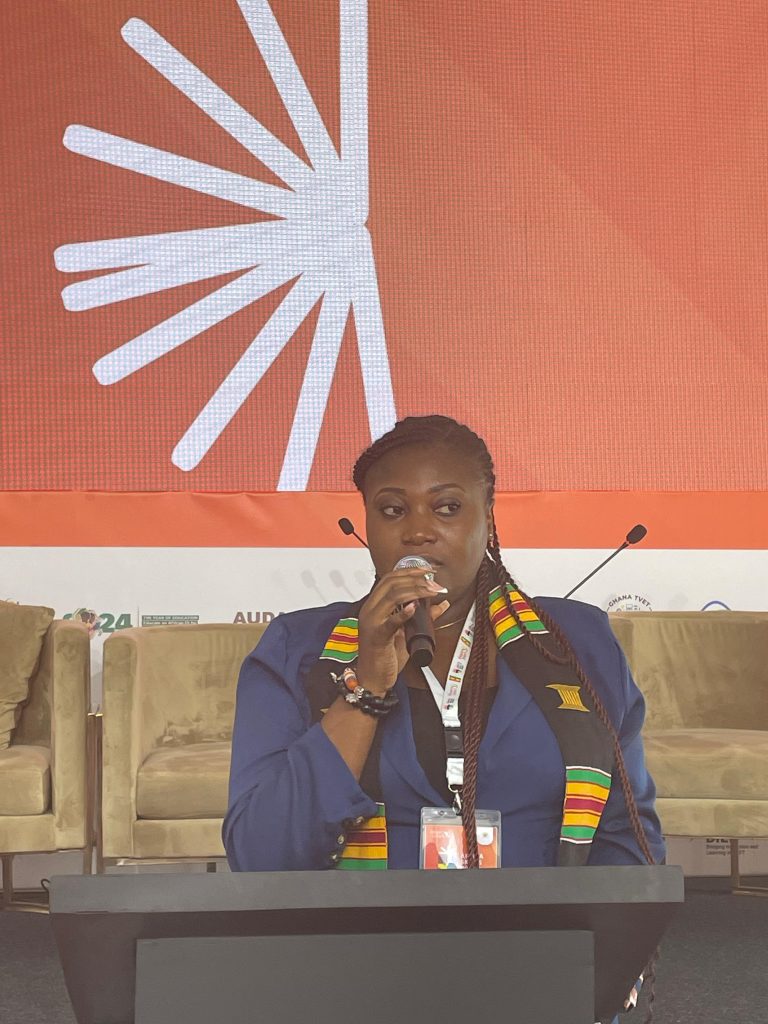
Grace is only one of many examples of the importance of opening up possibilities for refugees to use their skills and talent – not just to earn a living, but to enrich their new communities.
As a part of the inaugural Africa Skills Week in Accra, Ghana, Finn Church Aid, GIZ, ILO and UNHCR partnered to facilitate a lively and interactive session dedicated to the role Technical and Vocational Education and Training (TVET) can play in the economic empowerment of refugees and displaced populations.
An estimated 30 million forcefully displaced people live in African Union countries – among them, one third of the world’s refugees. Asylum seekers, internally displaced people and refugees are among the most vulnerable groups in any society, but also a large untapped economic resource.
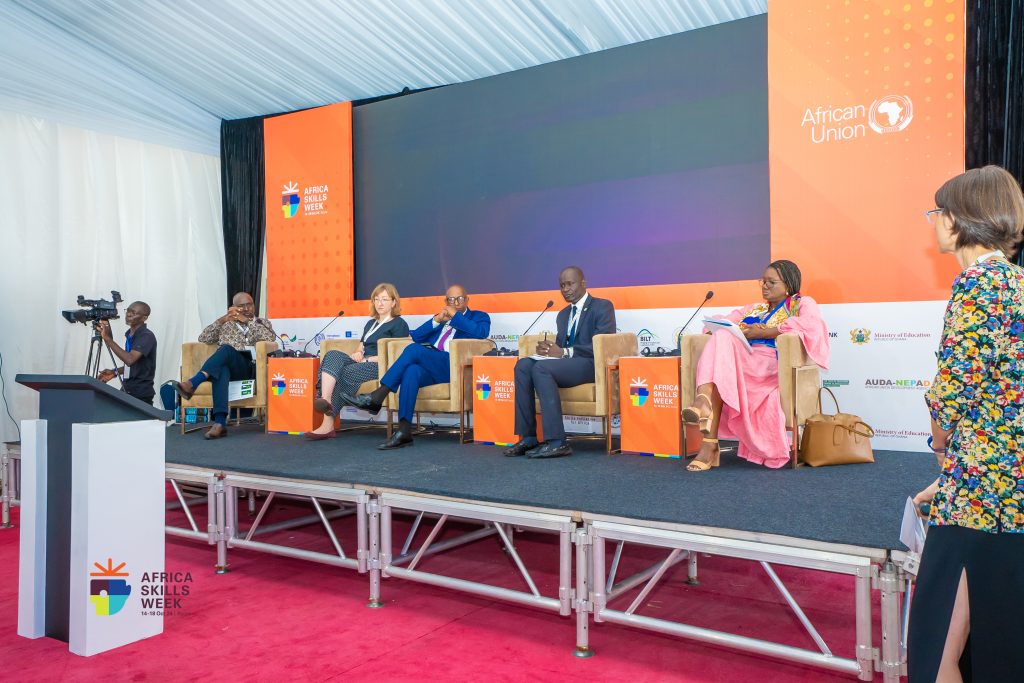
Long-term cooperation on TVET
The session was also part of FCA, GIZ, ILO and UNHCR’s long term cooperation to advocate globally for wider recognition of TVET as a key vehicle for self-reliance of refugees, bring experts together for peer learning and produce evidence on the impact of TVET in situations of forced displacement. Last year at the Global Refugee Forum, refugee experts and stakeholders were brought together to discuss TVET. This year TVET experts and stakeholders were invited to discuss refugee integration.
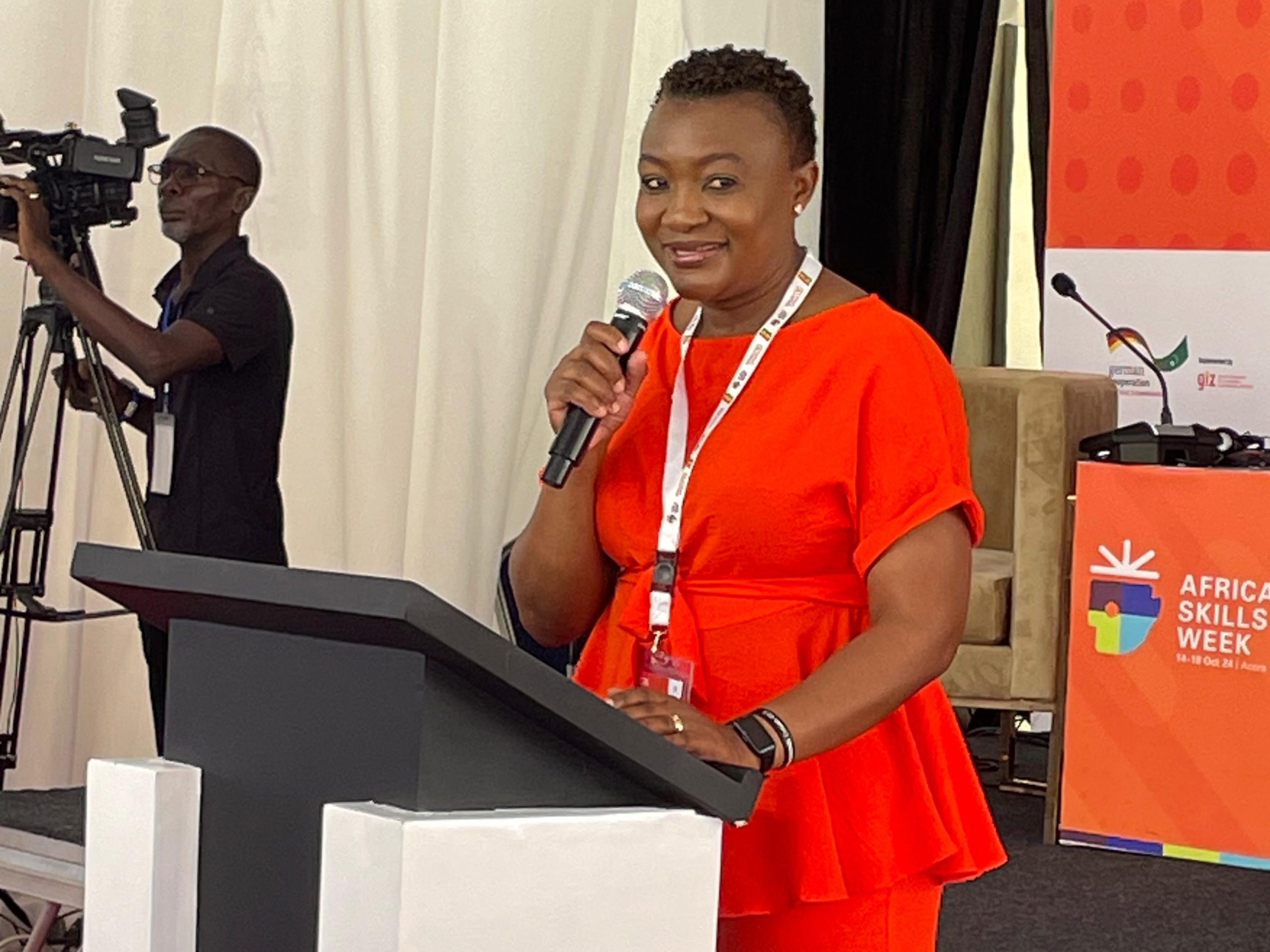
Welcoming remarks were delivered by the Head of Education Sector of African Union Commission, Ms Sophia Ashipala, who is one of the key experts of Continental Education Policy. Ms. Ashipala noted that the access to TVET is crucial for individual refugees, their families and self-reliance, but the impact TVET and access to work goes beyond economics:
“By providing refugees and host communities with the skills they need for gainful employment and sustainable livelihoods, TVET plays a critical role in fostering self-reliance and resilience. The evidence is clear—investing in skills development for refugees not only benefits the individuals involved but also strengthens the economies and social fabrics of host countries.”
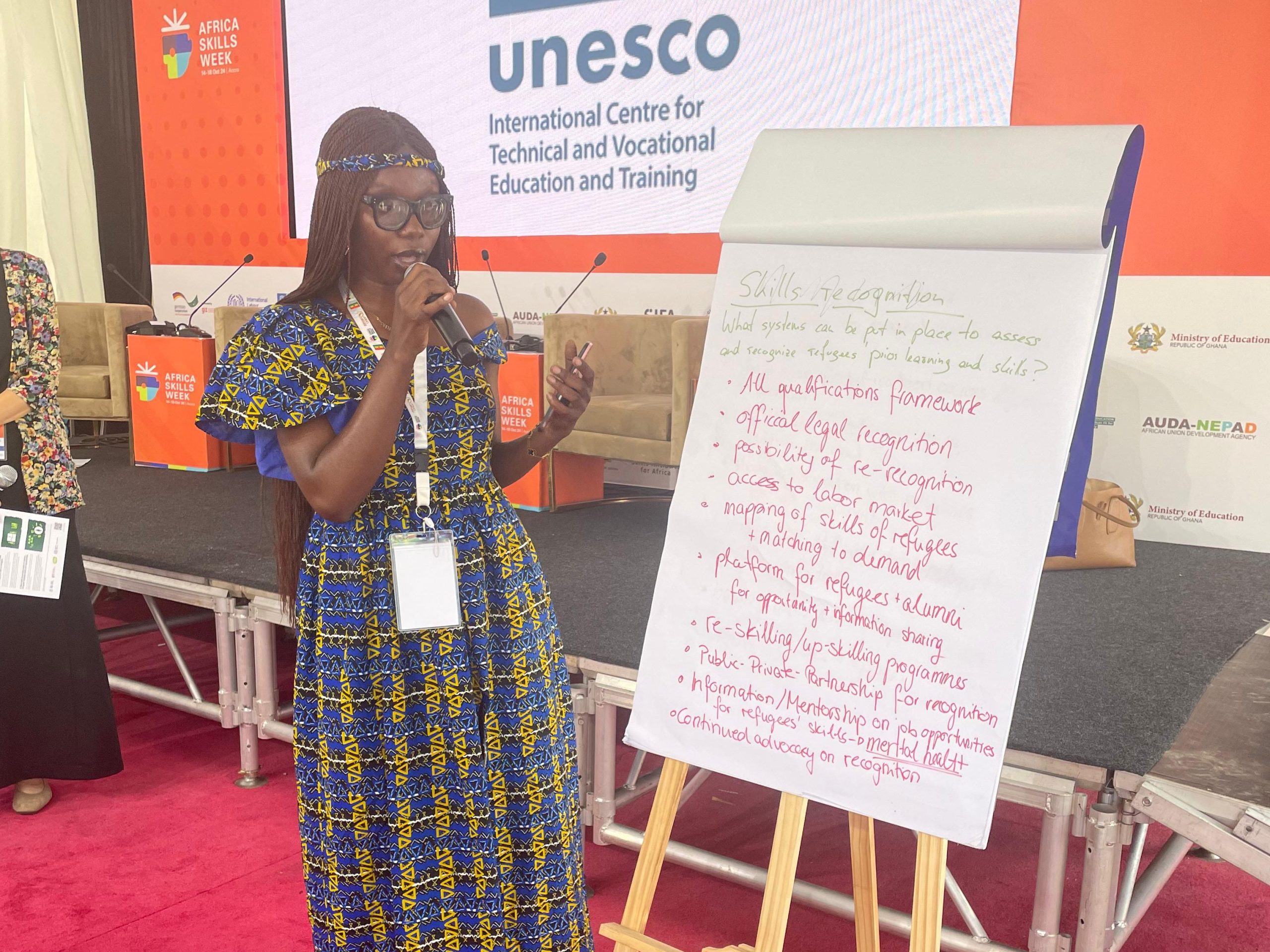
Mr. Dawit Moges Alemu from Confederation of Ethiopian Employers’ Federation brought to the discussion of the role of TVET in the reintegration of returnees. If refugees don’t have access to proper skills’ development – whether formal or informal, during displacement, it is very difficult for them to restart their lives and reintegrate, when they are back home.
Mr. Alemu also stressed the needs of the most vulnerable class of displaced people – the undocumented, who are often not allowed to move freely and have restricted access to economic life. Undocumented benefit greatly from skilling as the skills can help them achieve economic stability and hope in the ecosystem of the settlement community or the immediate surroundings.
Refugees’ right to TVET is a multidimensional issue
It was agreed among the participants, that what seems simple on paper, may not be simple in real life. The 55 member states of African Union are in very different situations, some are unfortunately places to flee from, some are hosting very few refugees, some up to two million. Some are welcoming to refugees and some have more complicated relationship with people seeking asylum. Some have better capacity to cope and some have immense difficulties to host refugees from neighboring countries. Refugee issues are also often politically sensitive. However, working together for a common vision where all African children and youth are given the opportunity to learn and thrive should go beyond the national differences.
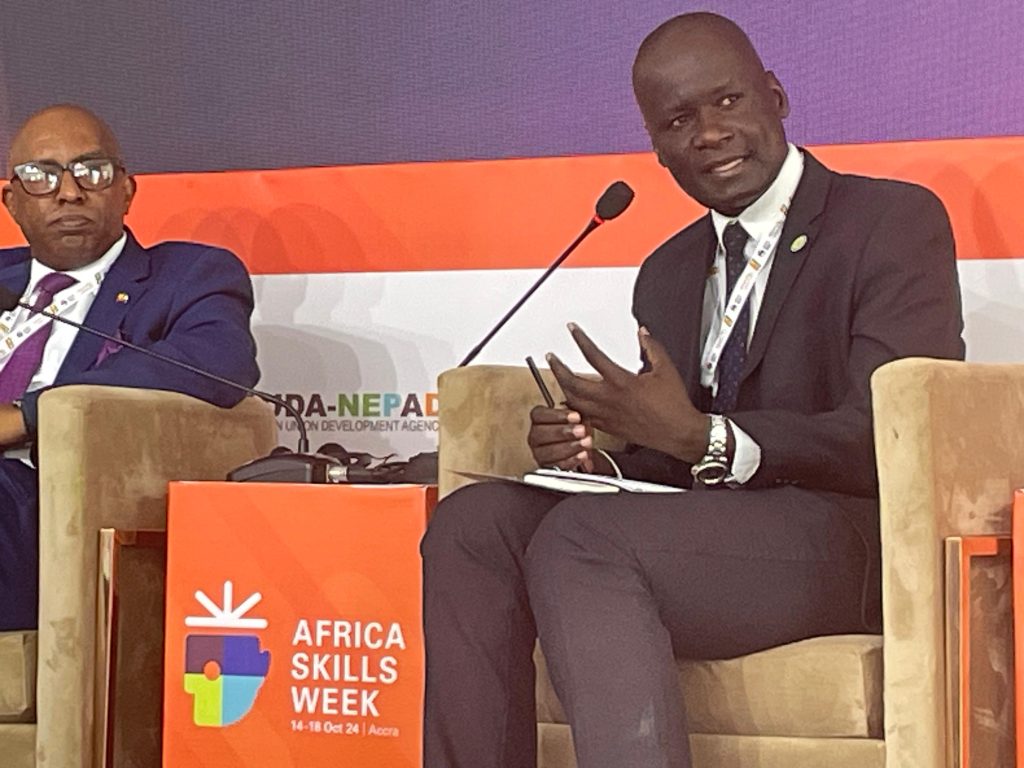
The African Union is revising its continental TVET strategy this fall. The current one coming to close this year, does not contain any guidance related to refugees. While it can be argued that refugees are included in the category of “other vulnerable population”, it is not sufficient as refugees face additional and specific legal, practical and cultural barriers of access both to TVET and labor market.
The text of the new continental TVET strategy will be finalized in November. During the Africa Skills Week there were encouraging signs that refugees’ specific needs will be given attention in the new strategy. FCA, GIZ, ILO and UNHCR will be available to support the implementation of the new strategy. Together we will continue working with national stakeholders in African Union to support moving from text to practice.
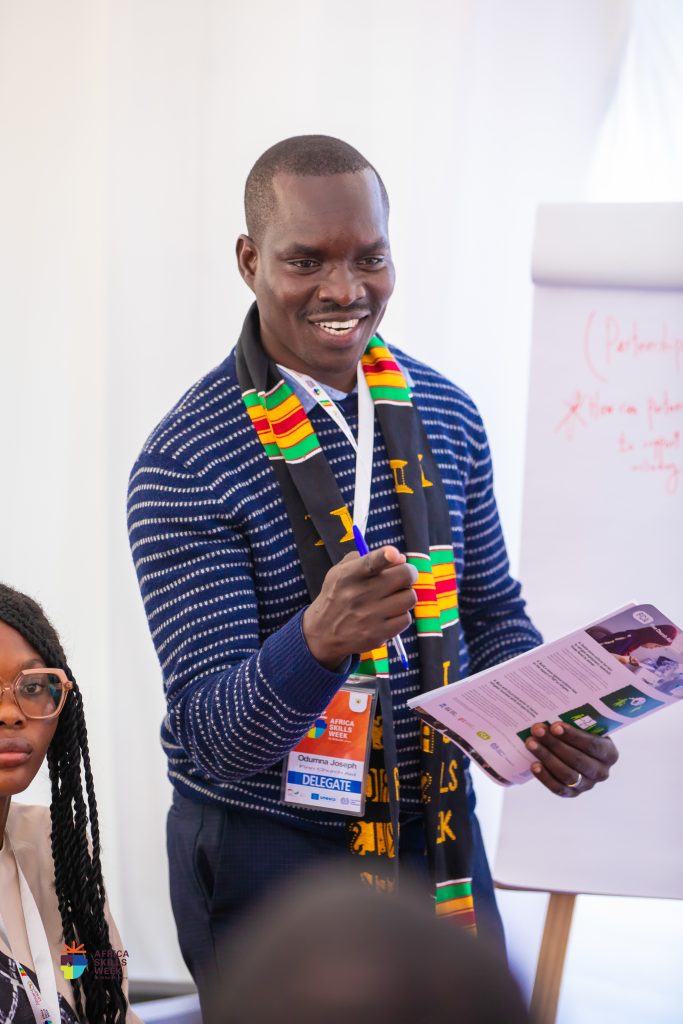
Ms. Birte Ifang, Senior Policy Officer from the Education Division From German Federal Ministry for Development brought the discussion back to the Sustainable Development Goal 4 on equal access to quality education across all levels and forms of education. She stressed that children affected by fragility, crises and displacement belong under SDG 4 and have the same right to education, including TVET than any other children. According to her, access of refugee youth to national TVET systems is an important level for the social and economic integration of refugees.
The event ended in call to action by FCA’s Joseph Odumna, who facilitated discussion on partnerships with the private sector, recognizing that private companies can be very risk averse when hiring from refugee communities. The room produced dozens of ideas, like incentives for hiring. Some are easily implementable some need years or even decades of work.
Many challenges, yet many solutions
The session included group work on the most pressing questions around refugees and access to TVET and skilling. Some of the key observations that came from the groups”
- A comprehensive national refugee legislation is a basis of refugee integration, but the specific circumstances and needs of refugees need to be considered and addressed across sectoral policies and legislation, such as laws governing TVET. This is a key to ensure consistent enforcement of right to education, including TVET.
- Physical access to TVET is only first step – once in school refugees need to have a conducive learning environment considering the specific challenges they may face.
- To foster peaceful coexistence between refugees and communities hosting them, it is useful that the policies of resource allocation is fair. TVET programs are also great places for refugee and host community youth to learn, solve problems and grow side by side.
- There is some work to be done to convince private sector to hire refugee graduates. It needs to be remembered that hiring refugees is not charity. We need to be sure that cooperation between educational institutions and private companies bring added value to both. And if so, it is not difficult to have private sector on board.
- While extremely complicated, having a joint qualifications framework across African Union, would benefit future generations of refugees and migrants alike. Having continentally recognized degree, would also help the refugee graduates from host country TVET institutions to return back to their countries of origin with sense of security.
Text and photos: Merja Färm, FCA Humanitarian Advocacy Adviser
Read more about our work with UNHCR, ILO and GIZ on TVET for refugees.
